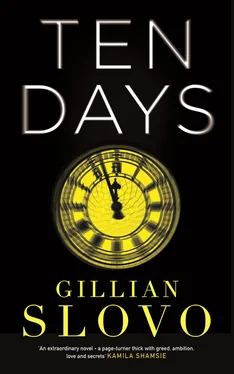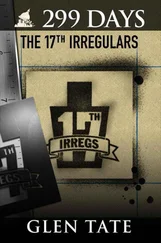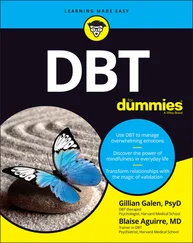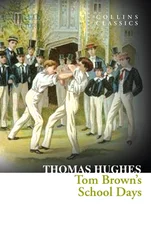If that was what they were doing, it was going to get very bad indeed. As an inner voice instructed her to turn round, go back, her feet kept on, taking her closer to the crossroads.
She had forgotten that this corner of the High Street had a wider pavement on which was sited a set of high, bright-green metallic lockers bearing the legend: ‘You order at home, we deliver here’. It was new to the area.
It no longer looked new. A group of young men had seen to that by using crowbars to wrench open the lockers and pull out the contents. She made to cross the road to avoid them, but before she could one of the men must have sensed that she was there. He turned abruptly, crowbar raised. He had a blue spotted bandana tied around the back of his head in such a way that it covered the whole area of his face below eyes that glared at her.
Is this how it was going to end? Downed by someone not much older than her daughter? She should run.
If she ran, he would catch her. She stood her ground.
His hand dropped. He reached into the drawer he had just opened and pulled something out. He thrust it her way. ‘Fancy this?’
She looked down at a square parcel made of cardboard. A book, she guessed. She shook her head: no.
He shrugged and let the parcel drop before applying himself to opening the next.
‘You know they’ve got CCTV on that building over there,’ she said. ‘And it’s pointed at you.’
He indicated his bandana. ‘We’ll hit the camera next. Bastards, watching us like we’re animals in the zoo. They deserve everything we’re gonna give them.’
She was on the brink of telling him that what he was doing was going to harm his community not the police, but Pius was right: this had all gone too far for reason. She turned away.
In that moment, everything changed. A man came running from the north. Abreast of them, he yelled, ‘They’ve torched the fabric shop. The building’s going to go up and there’s people still in the flats.’
When Lyndall was younger, Cathy used to play a game which they had called ‘Would you?’ A repetitive game. Mother to daughter: ‘Would you eat green vegetables if you were starving?’ Or: ‘Would you take a spider out of the bath if no one else was around?’ Daughter to mother: ‘Would you stop trying to make me eat cabbage if I was allergic to it?’ Or: ‘Would you run into a burning building to save me?’ Answers in order: ‘No’, ‘No,’ ‘But you aren’t,’ and ‘Yes, of course, darling, I would do anything to save you.’ And now, as she ran down the road with the men who had been attacking the storage lockers, Cathy was contemplating going into a burning building to save not her daughter but some strangers who might not even be in there.
Not that the building was yet burning. The shop beside and below it was: smoke poured through the front where the glass was already smashed. Above and to the side of the shop front was a set of flats. A side door would have given them access, but it was closed and locked.
A man was already trying to kick it down. He kicked. It shuddered but did not break. He kicked again. Another man was jabbing at the intercom even though a wire trailing down from its base suggested that none of the doorbells had worked for some time.
‘Move.’ Two of Cathy’s companions yanked the men from the doorway before going to work on it. They hit at the gap between door and doorjamb, opening up spaces top and bottom. As the helicopter hovered, drowning out all other sound, the men inserted their crowbars into the spaces they had created. That done, they beckoned two of their fellows forward and together all four pushed against the lever of the crowbars. The door did not budge. More gesticulation and the four dropped their crowbars, moved away from the door, held hands and ran at it, and kicked. They did this three times until at last the door caved in.
They went into the building, Cathy following. There was smoke visibly leaking through the edges of a blocked-up door that must once have led into the shop. Someone was taking charge, pointing each of them to different floors. Cathy was allocated the first floor along with the man who had tried to present her with the book. As she made for the stairs, he took the bandanna off his face and tied it around hers.
‘What about you?’ She was shouting over the noise of the helicopter.
‘I’m cool,’ came his reply. ‘Come on now, lady, let’s roll.’
There were two flats on the first floor. Cathy banged on the door nearest to the stairs. No answer. The man pushed her out of the way and kicked the door. Either he was a pro or else the door was not as robust as the one downstairs, because it crashed open. In they went, running from room to room. The place looked like it had been hurriedly abandoned with half-filled cups and unwashed plates littering a kitchen counter. Great: whoever had been here had gone.
The smoke was thicker now and darker than it had been. Her eyes were smarting and her throat felt as if somebody was sticking it with pins. She ran to the second flat and banged on that door. Waited. And banged again.
‘They’re gone.’ With every breath, more smoke was clogging her lungs. ‘Let’s get out of here.’
He shook his head, pushed her out of the way and launched himself, shoulder-first, at the door. Which fell. He was there and then he was gone, running into the flat. The smoke was now so thick it was as if it had swallowed him. She called out as she came to what must be the living room. He was next to her and she hadn’t seen him. ‘Go to the left,’ he shouted in her ear, pushing her in that direction, ‘I’ll go right.’
She went left and found herself in a small room. It wasn’t yet as badly affected as the rest of the flat, so she was able to see, through the smoke that was drifting in, the outline of a single bed and a chest of drawers — the only furniture there. She heard him calling, ‘Nobody here.’
They’d done their best. They could leave. They had to before the fire felled them.
She was on her way out when a movement at the peripheral edge of her vision brought her to a halt. She turned.
In the short space of time that she’d been in the room, it had got worse. A blanket of grey fog was beginning to obscure her vision; she must have mistaken it for movement. Nobody there.
A cough.
Someone. But where?
Under the bed?
‘Help! Here!’ Her shouting made her cough. She doubled over, calling, ‘Here!’ as loudly as she could.
He was already in the room. She felt him pass her by. He must be going to the bed. She heard a creaking of metal. ‘Give me a hand.’
She stumbled over to his side. Crouched. Two figures under the tilted bed. She could just make out their shapes: a woman and a small child who were cowering against the wall.
She stretched out a hand.
The woman pulled her child closer and inched away.
The bandanna. It must be scaring her. Cathy ripped it off. ‘Fire,’ she gasped. ‘Come.’
This time when Cathy reached for the child, the woman handed her over before scrambling out herself.
‘We’ve got to get out of here.’ Grabbing the child, the man made for the door.
Cathy was about to follow him when the woman said something she didn’t understand.
‘We’ve got to go,’ Cathy said.
The woman turned away.
‘We have to.’
The woman darted off and across the room to the chest of drawers. She snatched a gilt-framed photograph and a pack of baby’s nappies that had been on top.
‘Come on.’ Smoke so black and thick it felt as if they might have to carve a passage through it.
The man and child had disappeared. She made herself retrace in her mind the route in, the number of steps through the flat, counting them back, as with one arm around the woman’s shoulders she stretched the other out in front, feeling for the gap where the door should be. Her mind told her that this was a small flat: how hard could it be to get out? But her perception told a different story: it was as if the smoke, black now, had become the room and it was infinite. She had no idea which way to go.
Читать дальше












